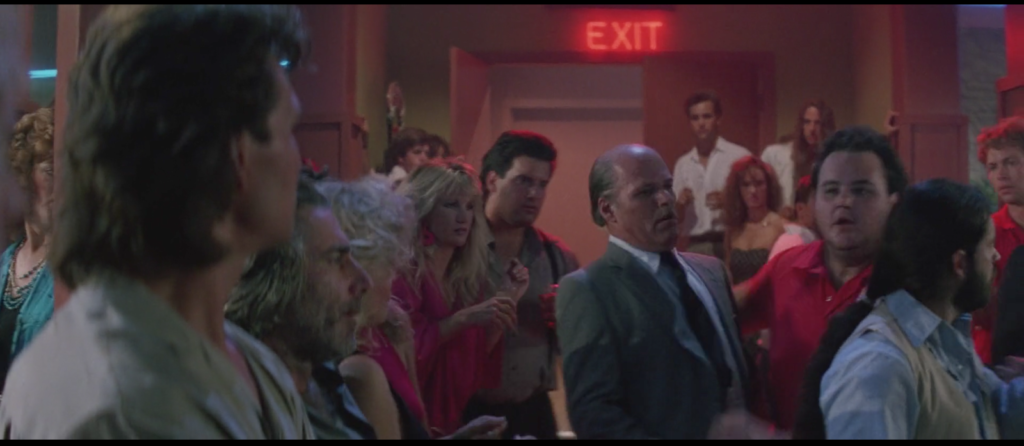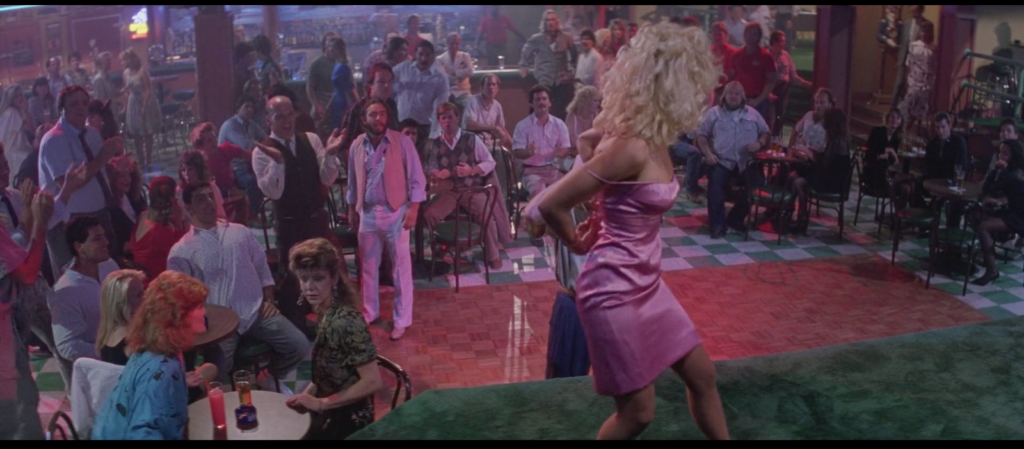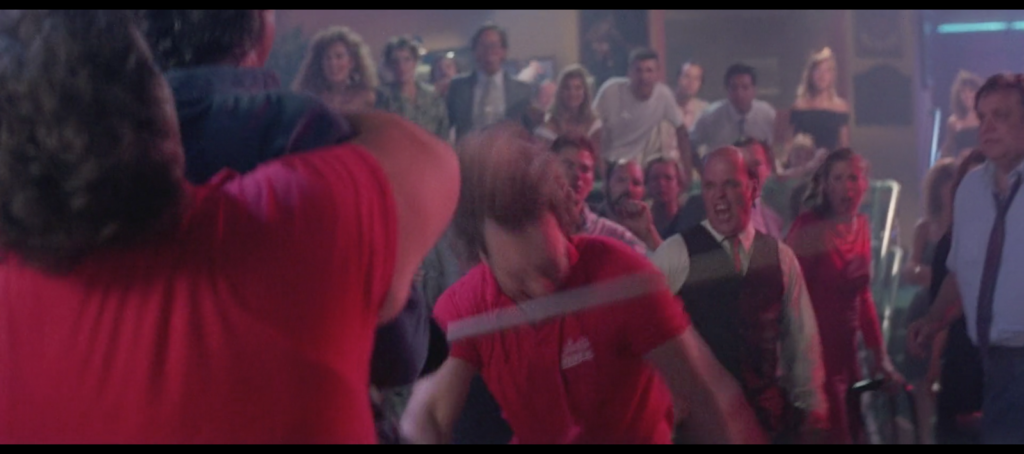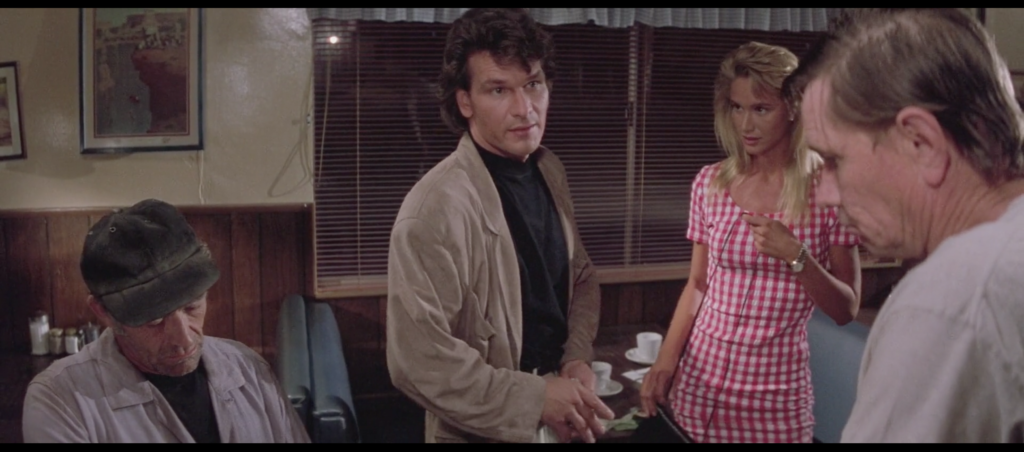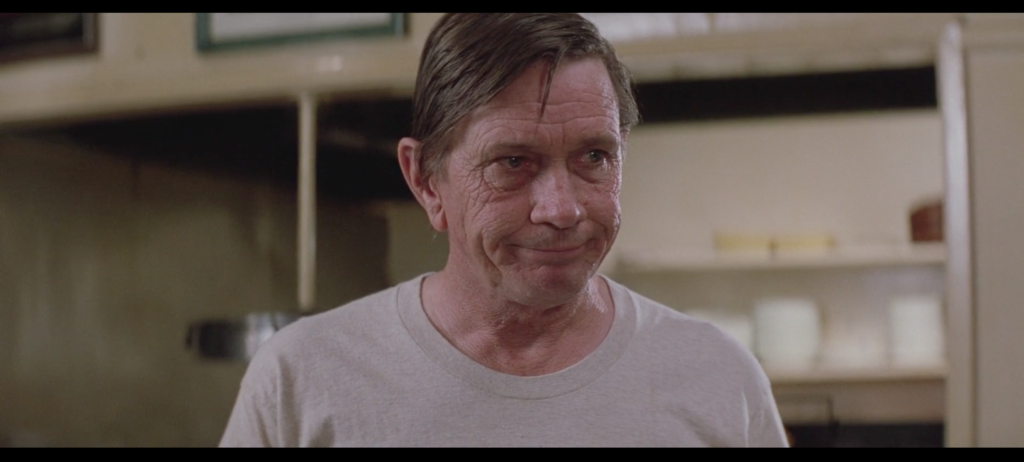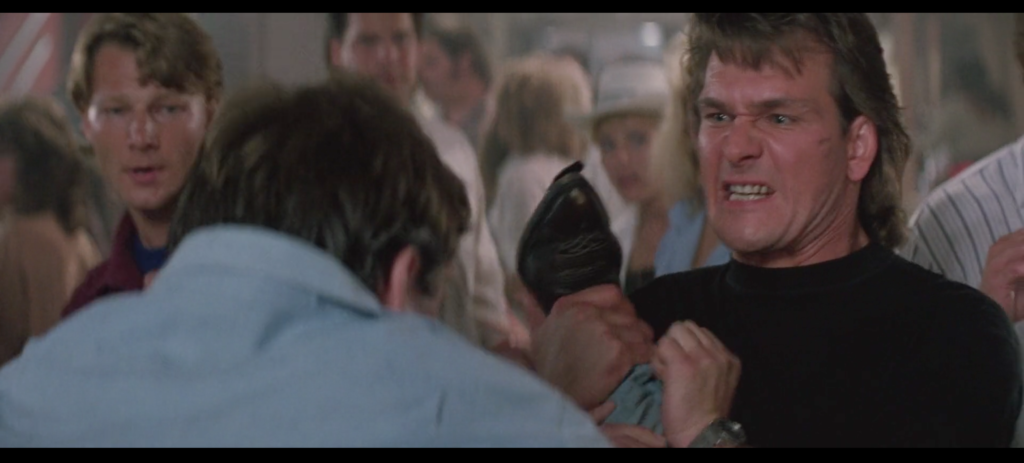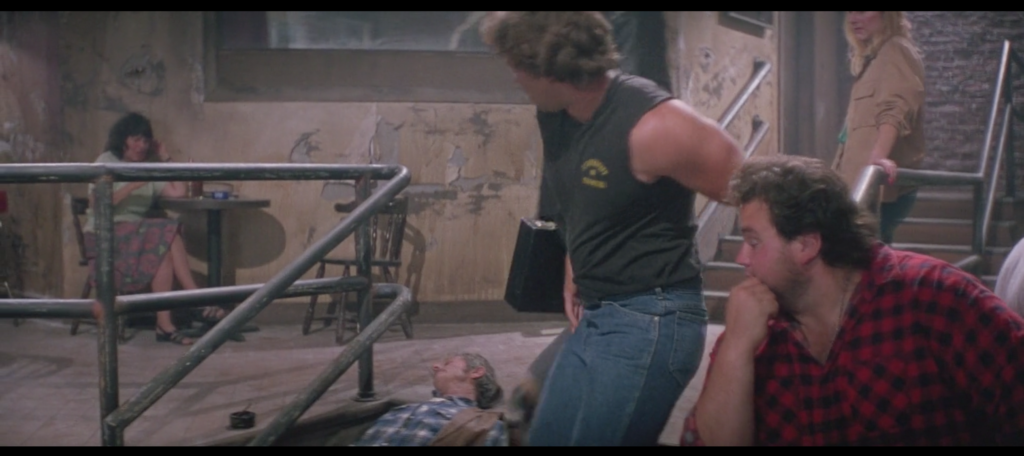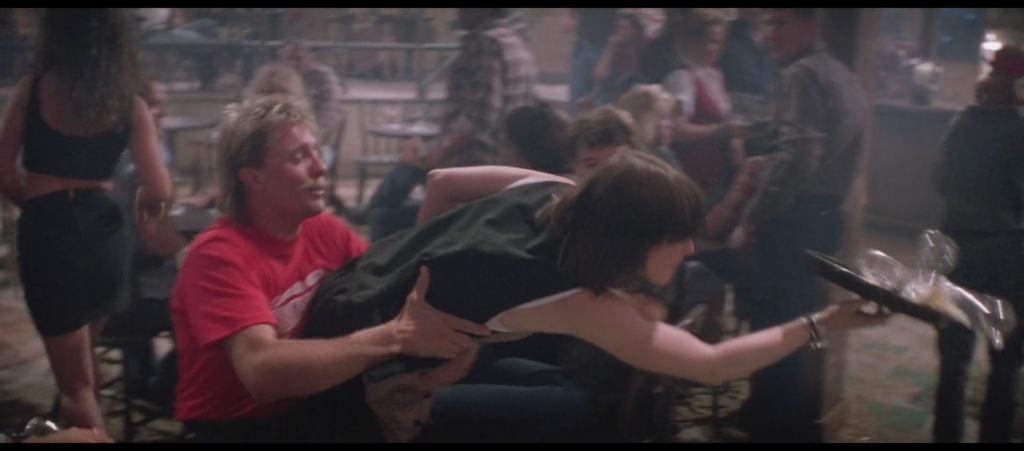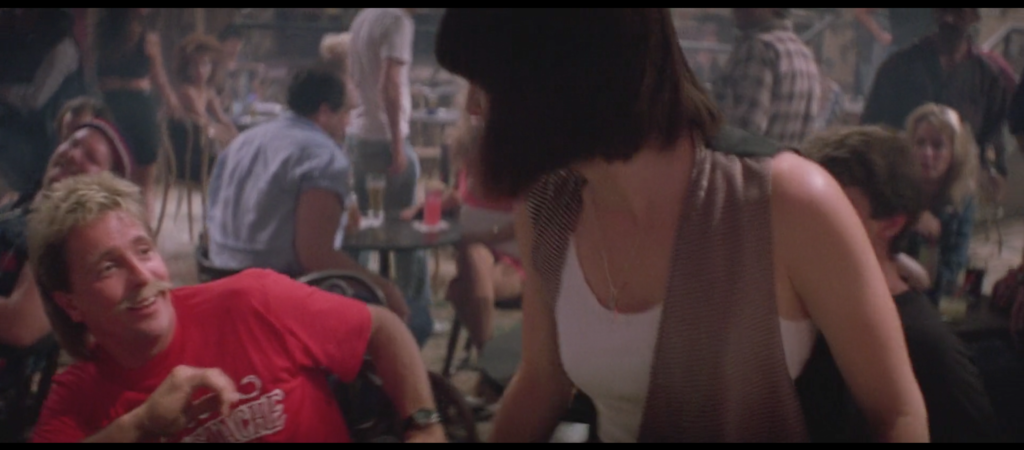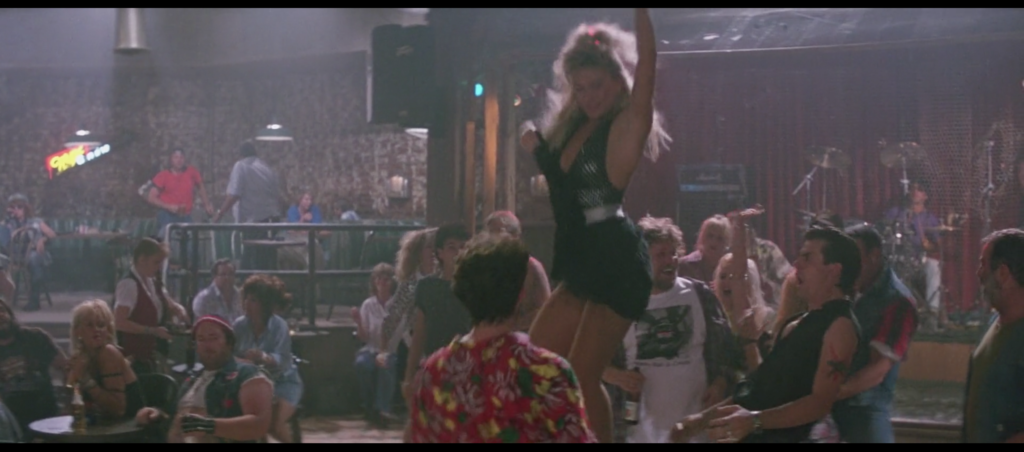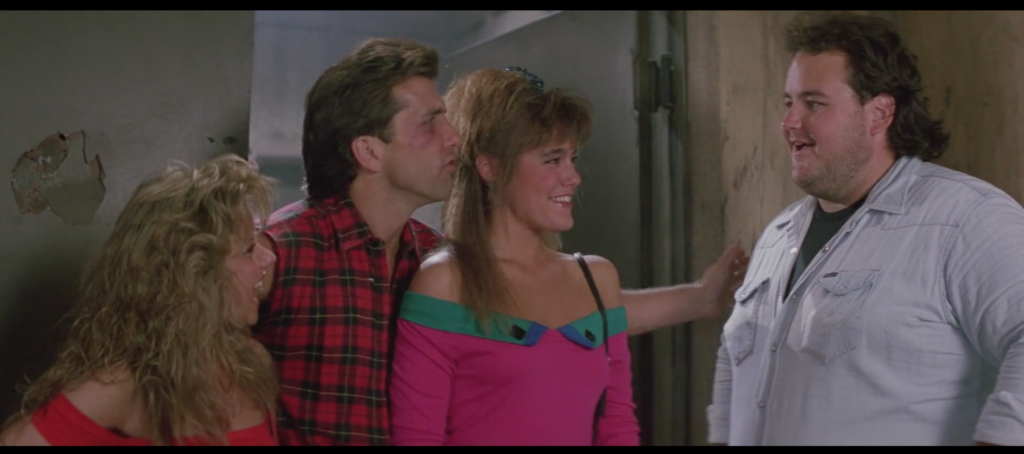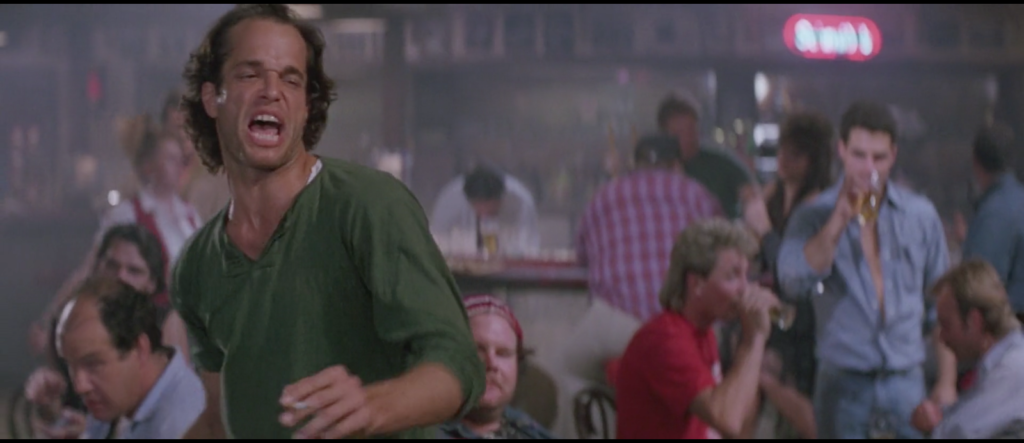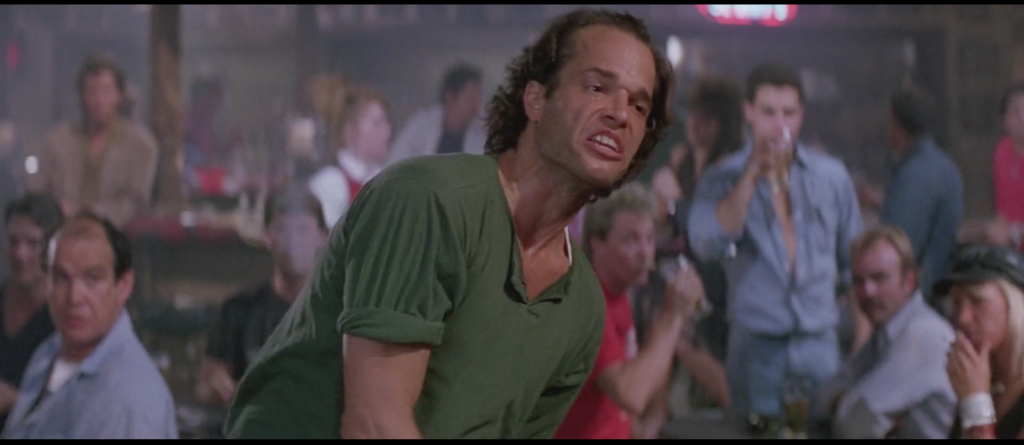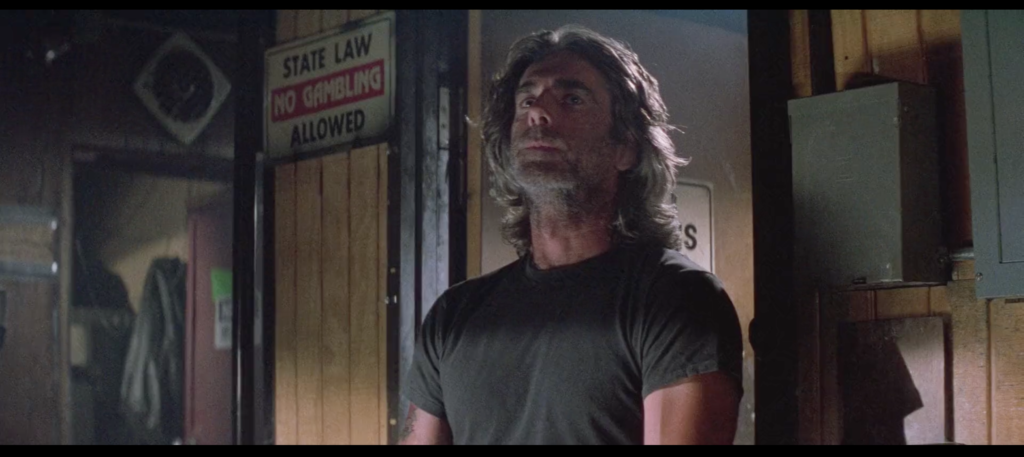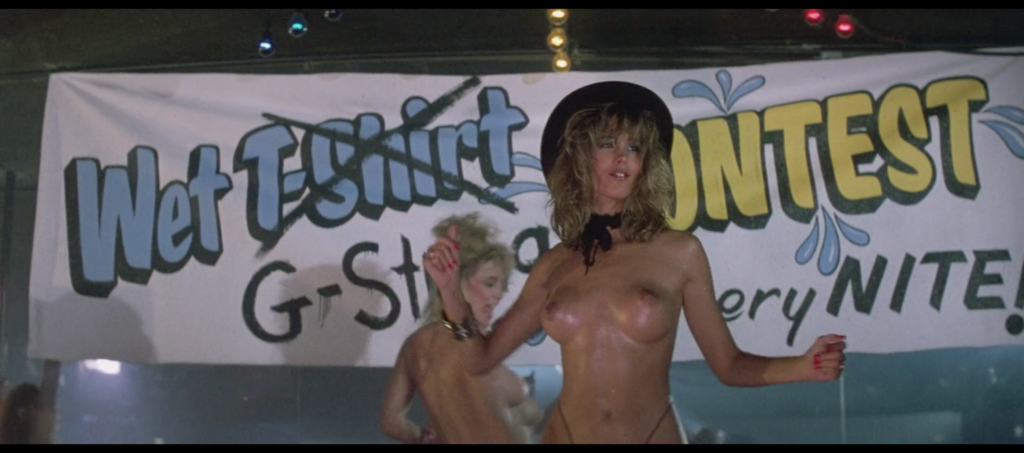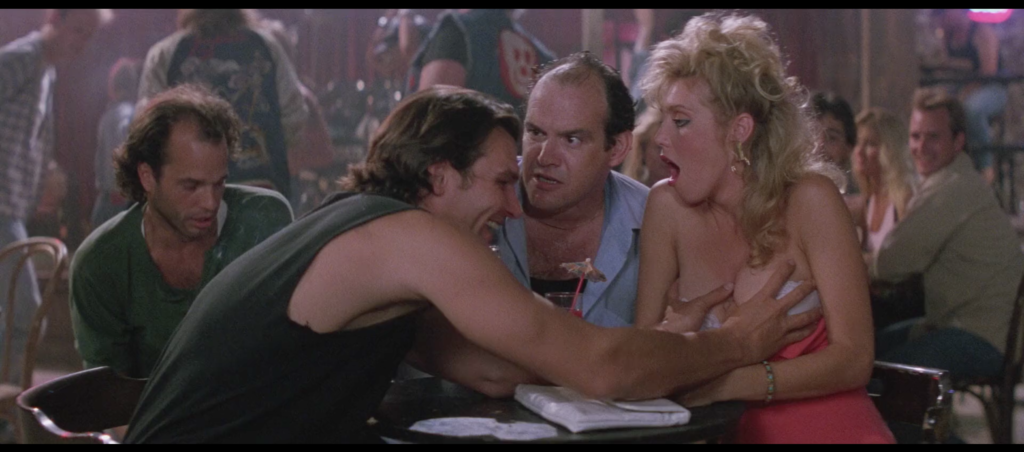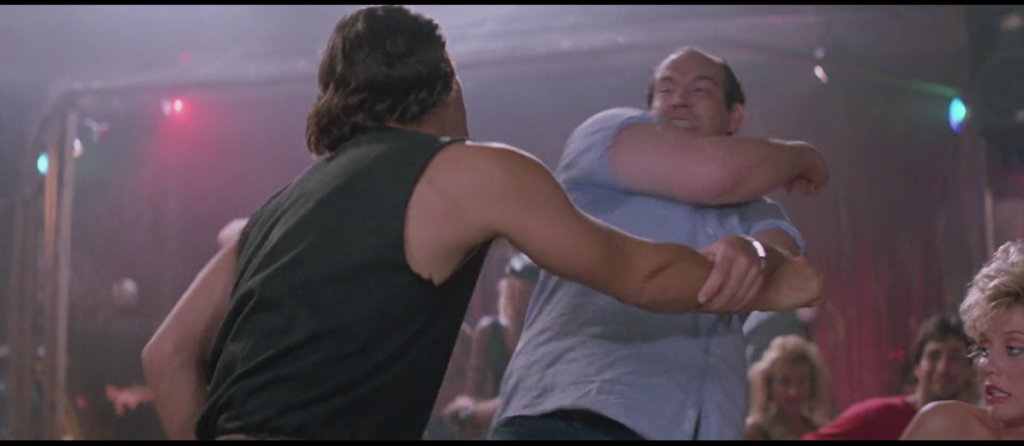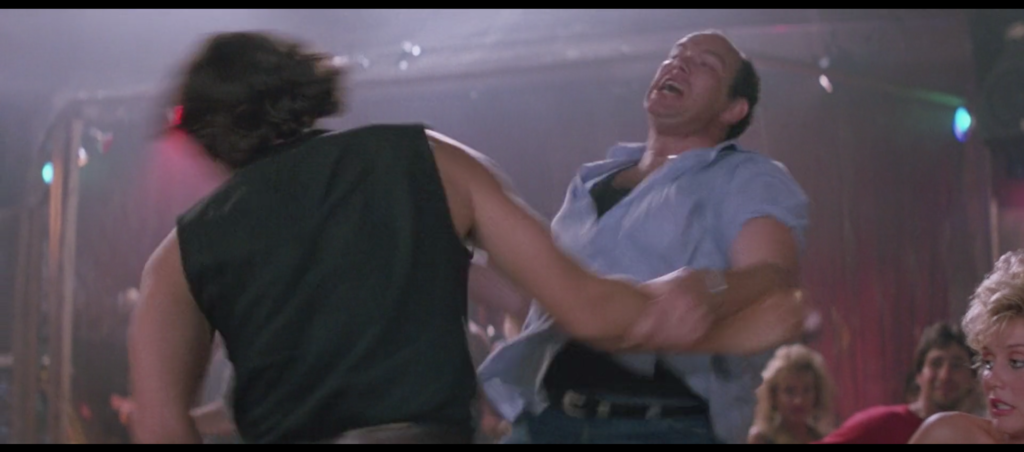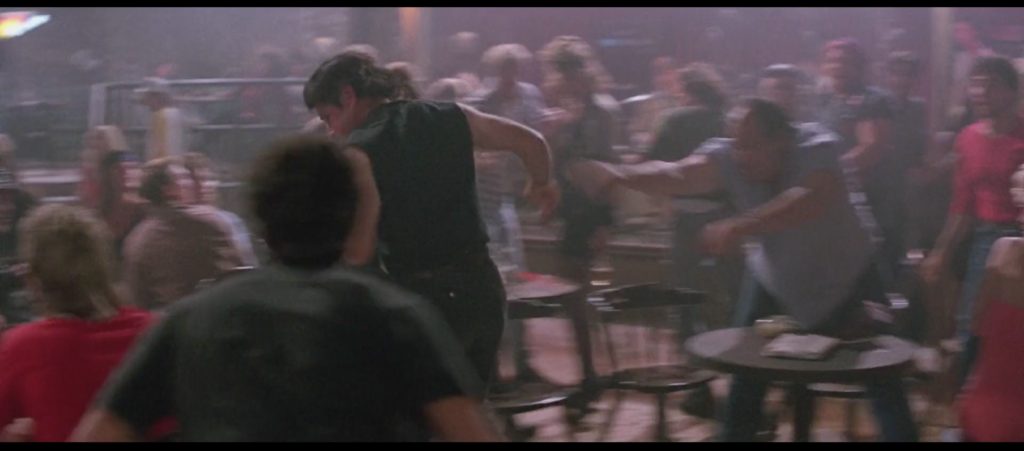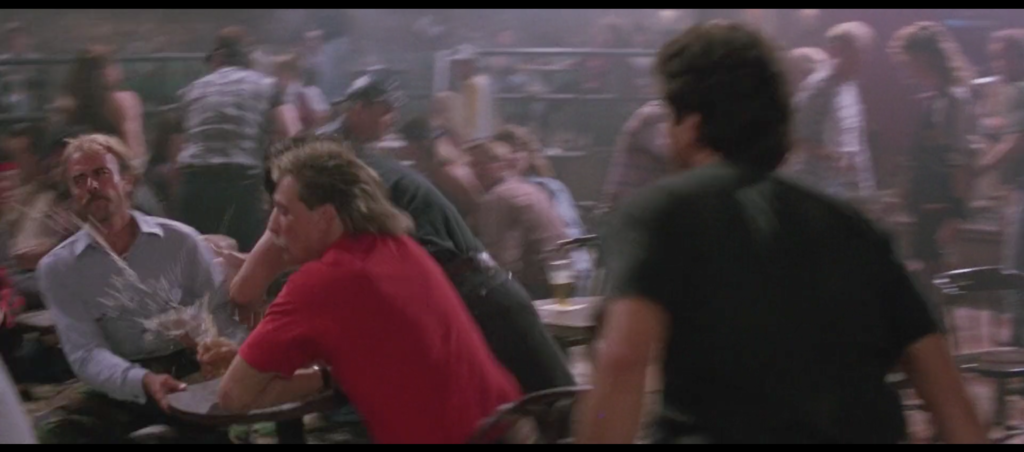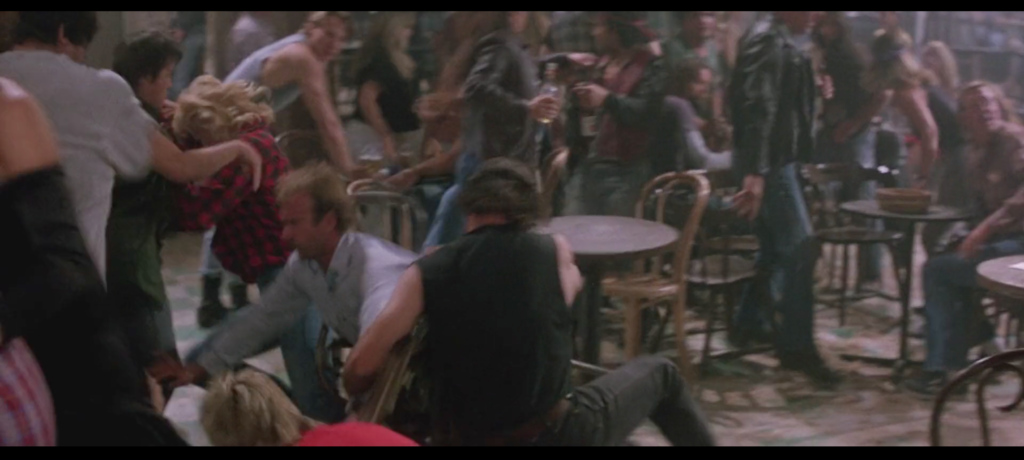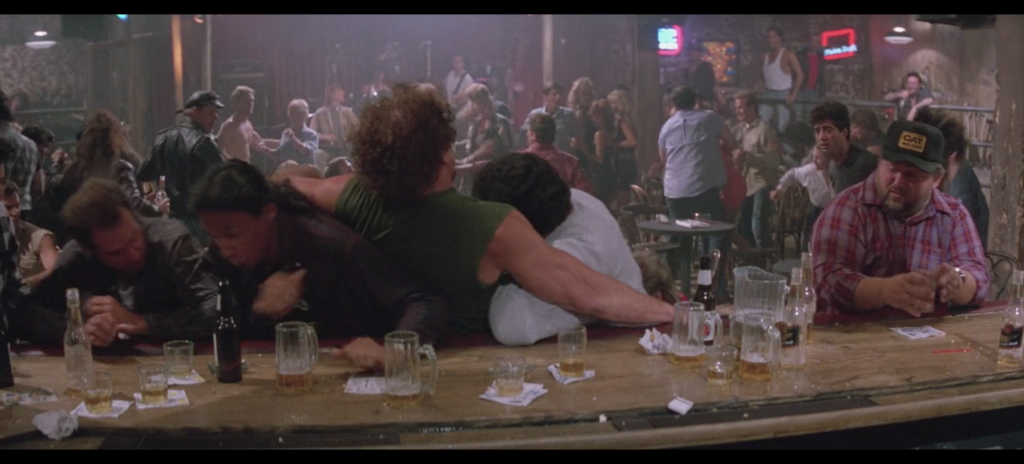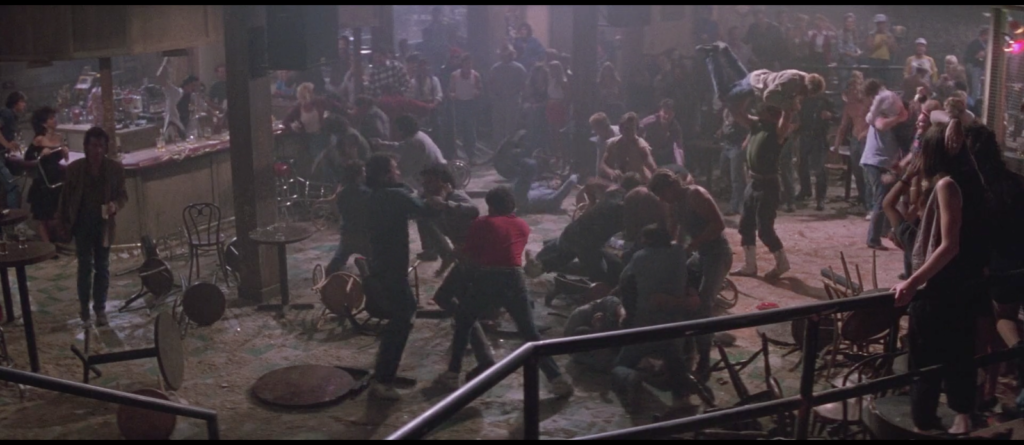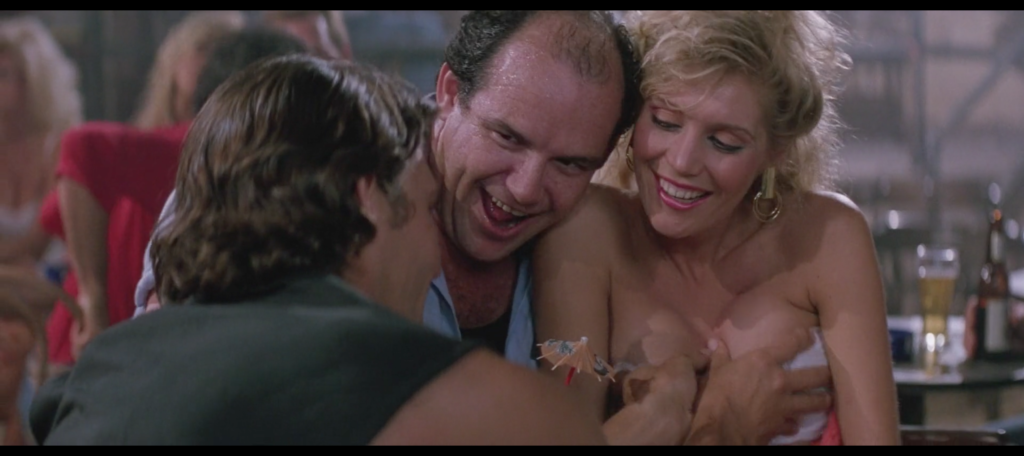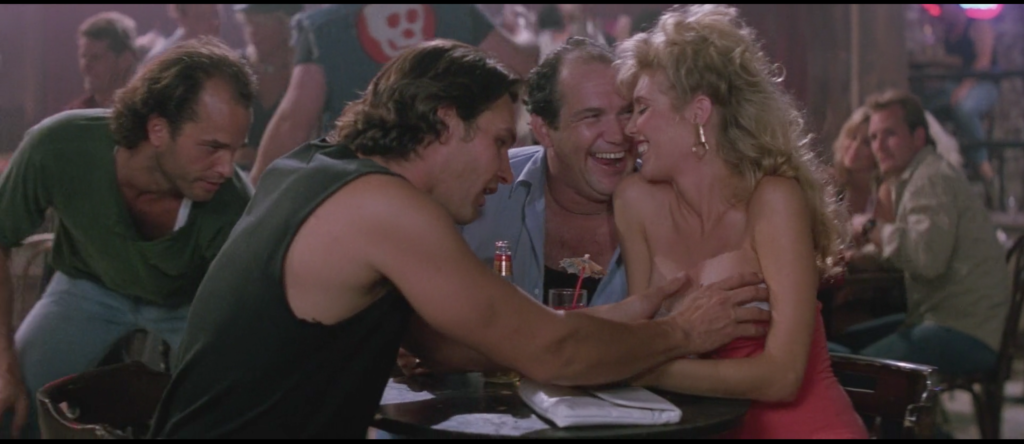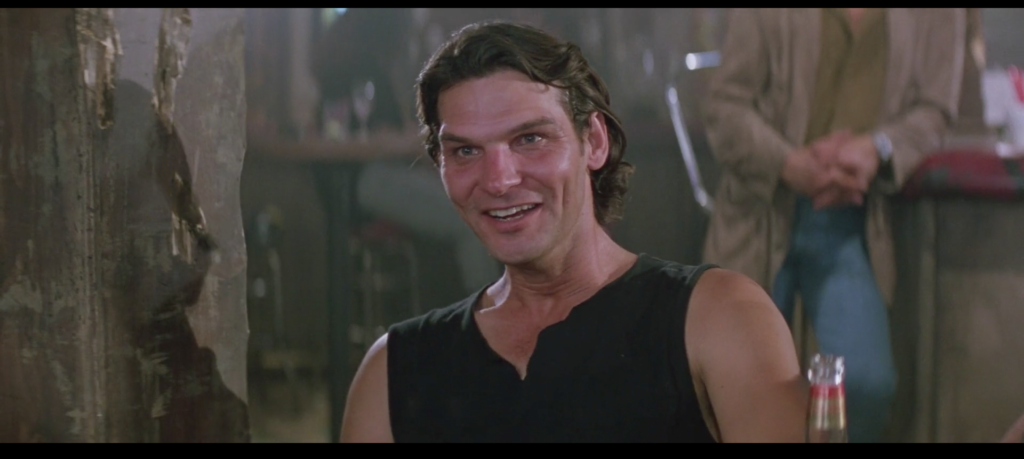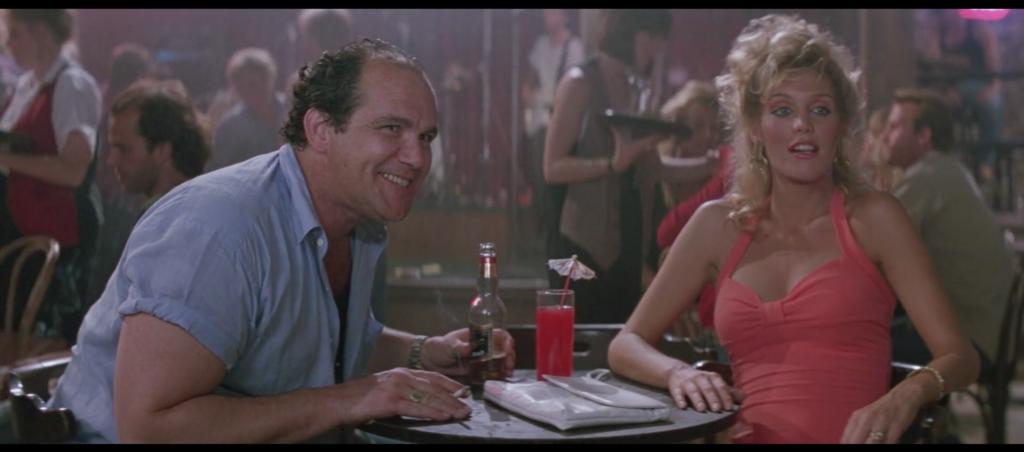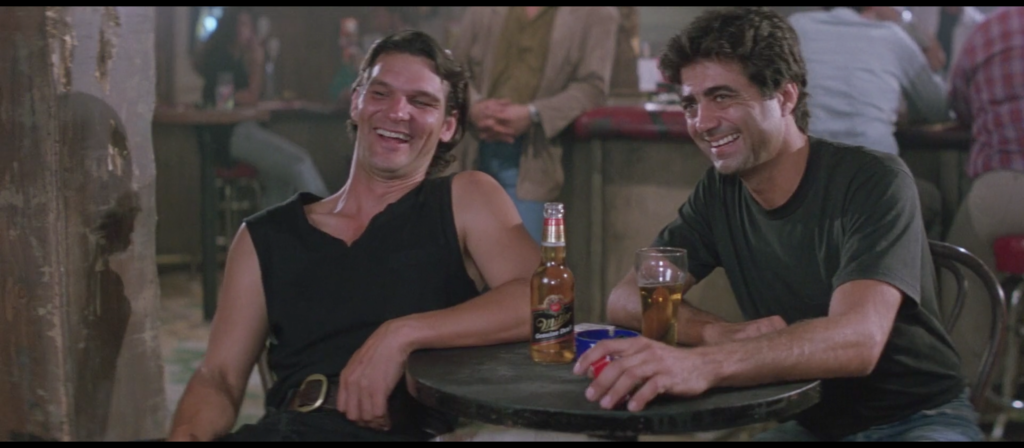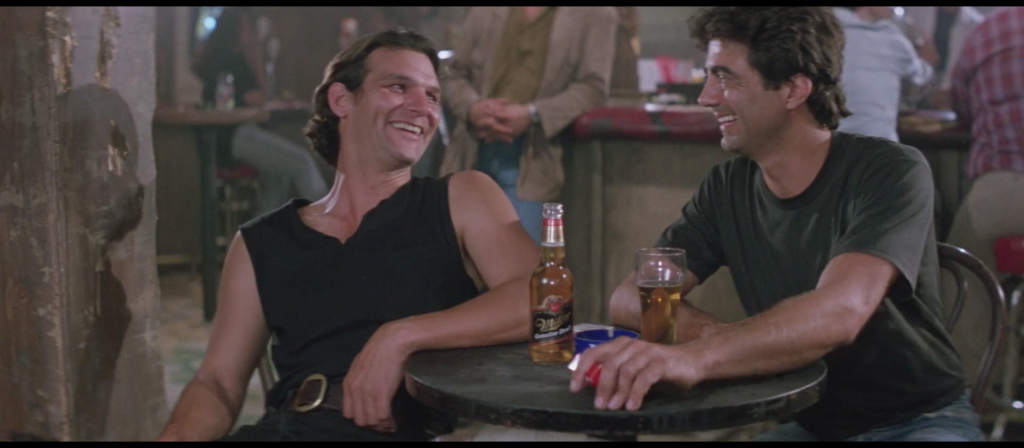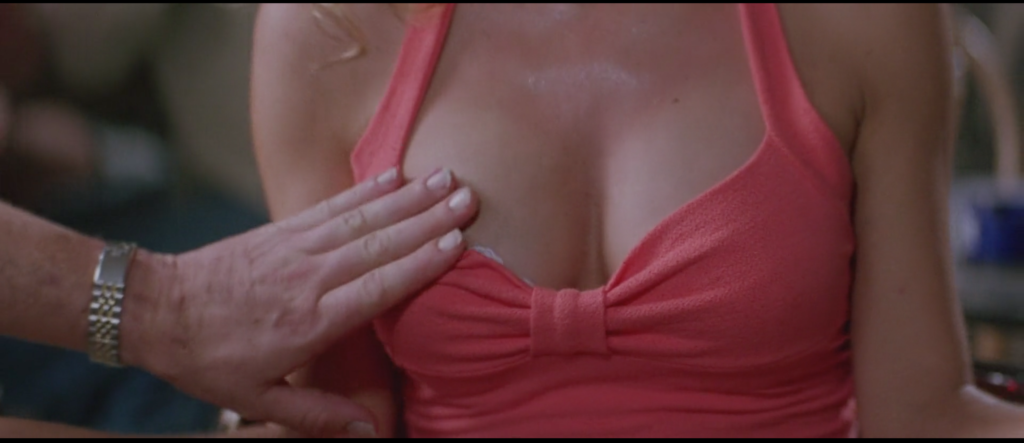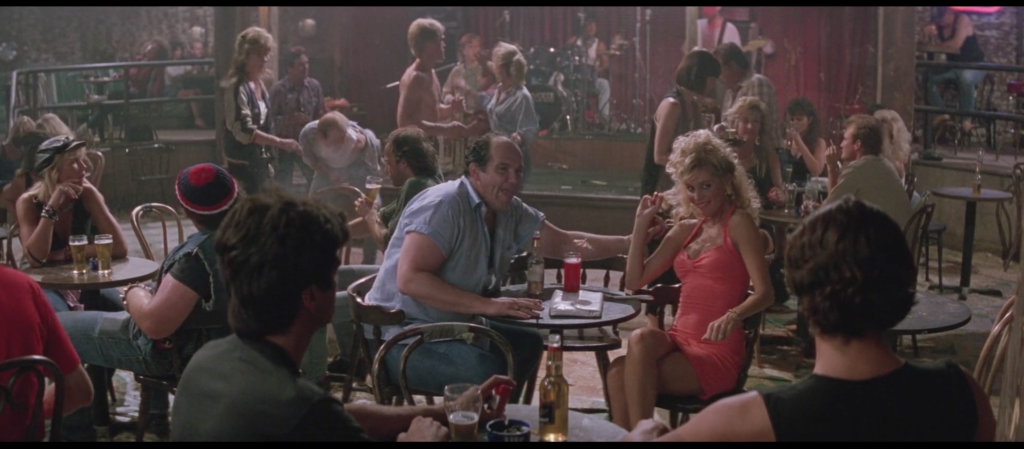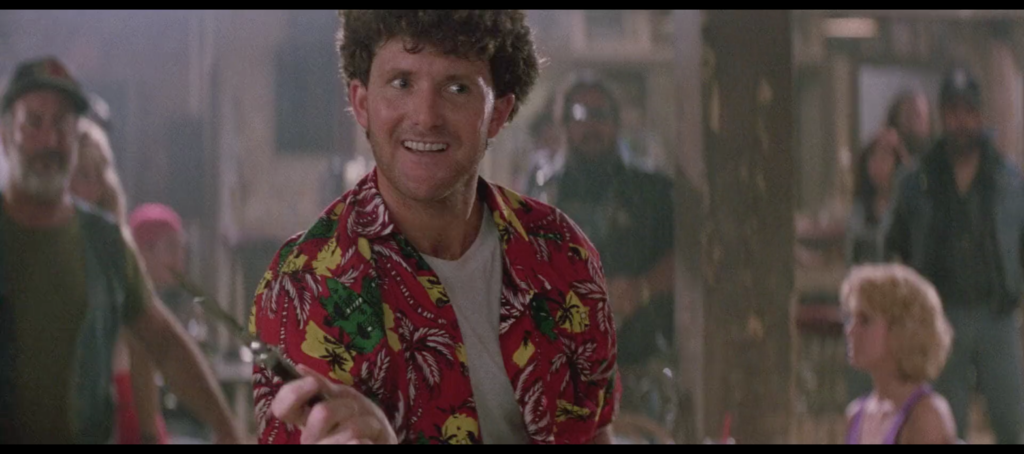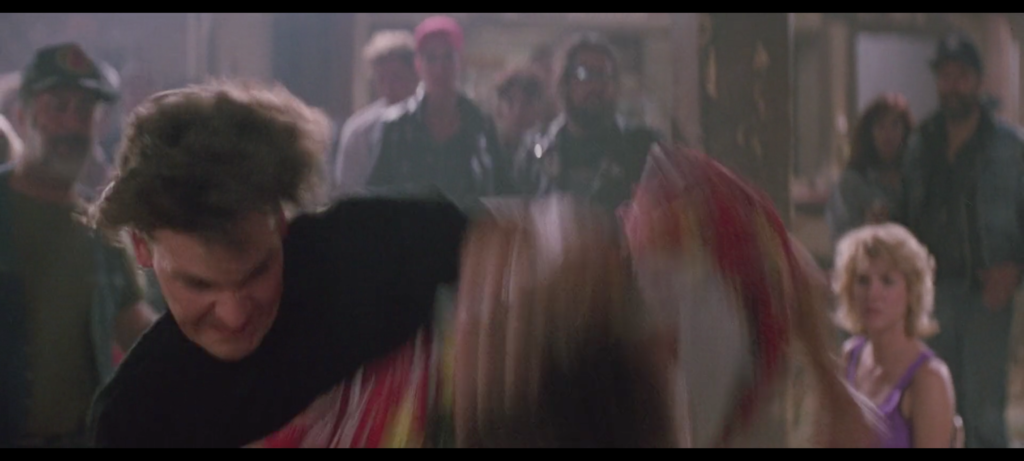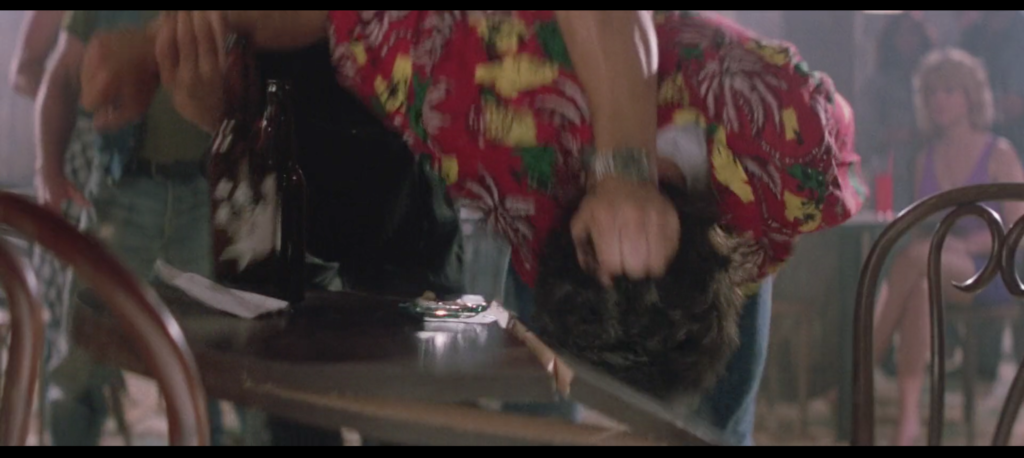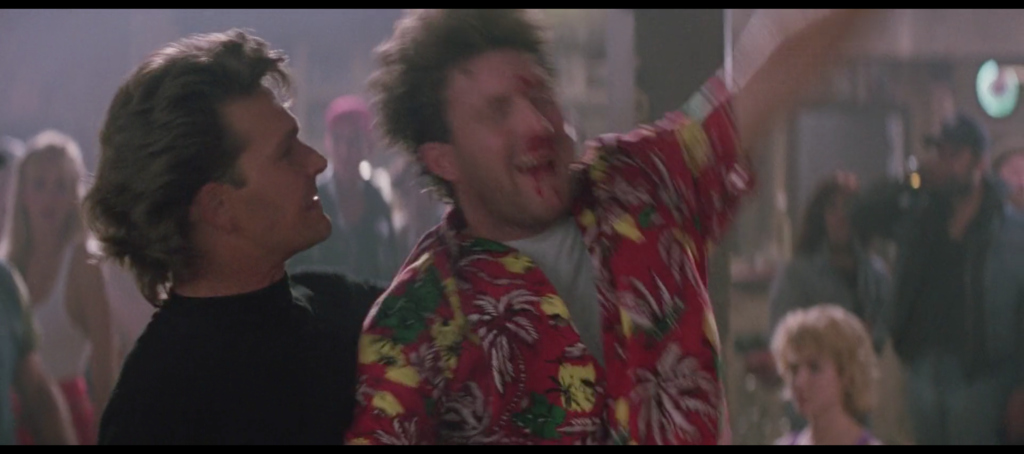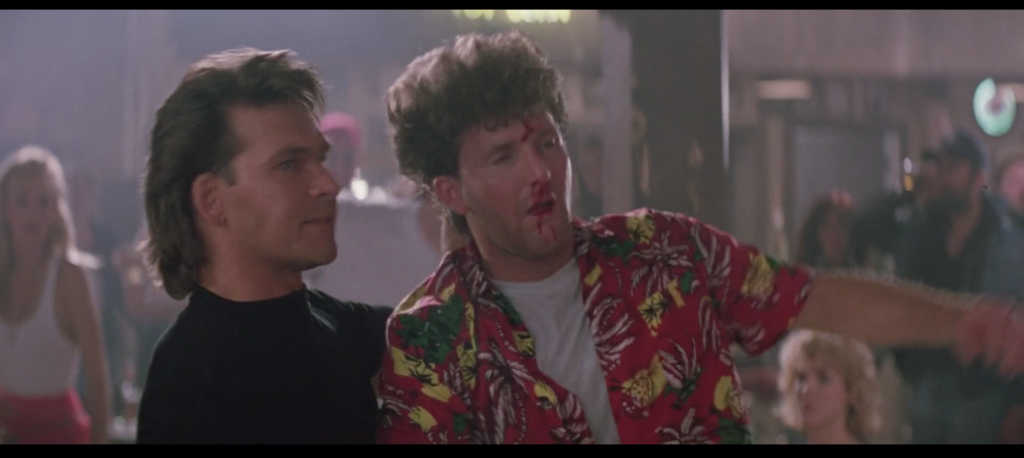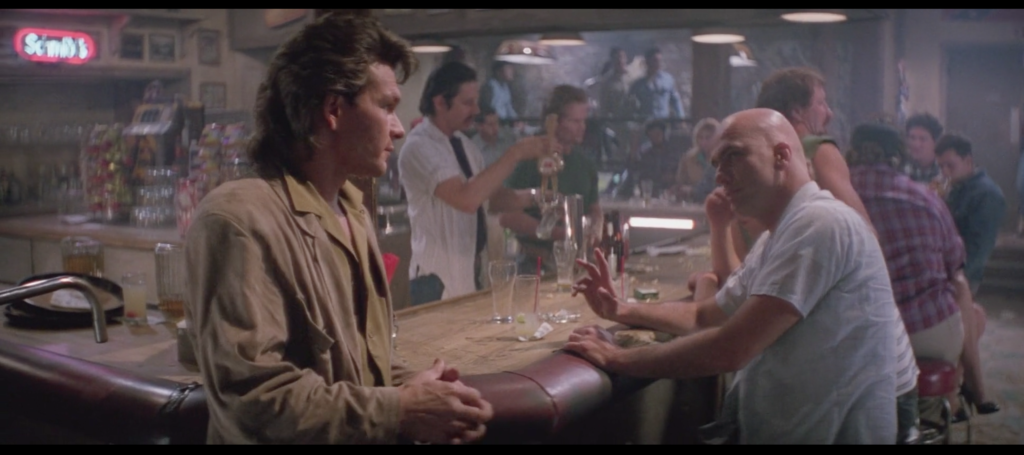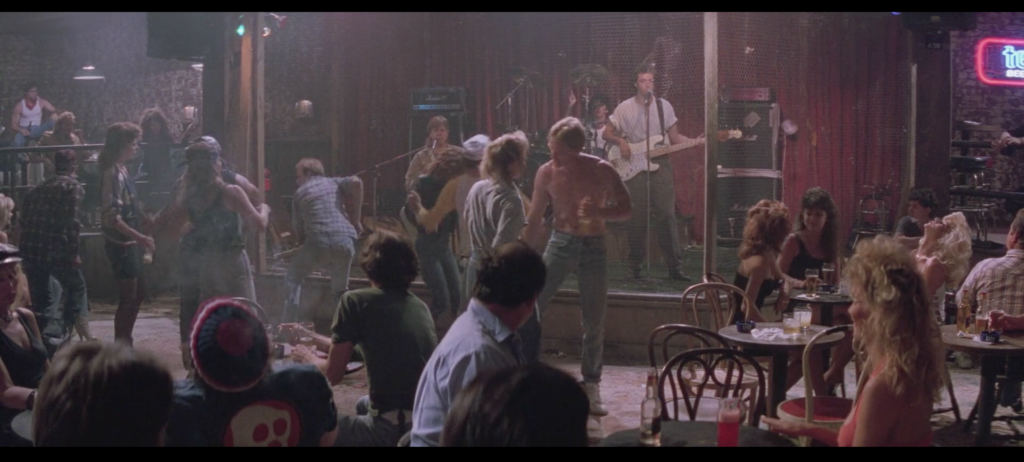Posts Tagged ‘barflies’
259. The Suit
September 16, 2019At this late stage of the film, in this Time to Not Be Nice, great extras and background actors are largely a thing of the past. Wasn’t that Dalton’s entire raison d’être—to expunge the 40-year-old adolescents, felons, power drinkers, and trustees of modern chemistry—the Shirtless Man, the Foxworthy, the Mr. Clean, the Well-Endowed Wife? Other than their shared penchant for ostentatious hats the patrons of the new Double Deuce are a nondescript sort.
So it’s truly something special that the Suit stands out. That’s him getting shoved out of the way by Jack when the fire at Red’s break out, reacting with a stunned fervor usually reserved for members of the high school drama club who don’t get a speaking role but are pretty distracting in crowd scenes. That’s him again—sans jacket, now in a different color shirt and a vest—hooting and hollering at Denise’s dance like a man who’s never seen tits before, or at the very least has spent a long time in some sort of monastic community not of his own free will. And that’s him a third time, baying for blood as Jimmy whips the shit out of all comers.
A distinctive look. A face that’s expressive to the point of overdoing it, like a commedia dell’arte mask. The bald, browed pate of an angry Ugnaught. A three-piece suit at the white blues bar. The Suit, most extra of extras and last of a dying breed, has it all.
154. Tonight’s rent
June 3, 2019Road House is all over the map when it comes to crusty weird old guy solidarity. It is undoubtedly true that a Frank Tilghman/Pete Strodenmire/Red Webster/Emmett alliance tandem-murders Brad Wesley to end his reign of terror and free Jasper forever. But this requires the sacrifice of their comrade in grizzledness Wade Garrett, as well as a great deal of groundwork laid by young Dalton, who murdered five people and incapacitated a sixth with a stuffed polar bear so that the old timers could infiltrate the Wesley compound. Moreover, it is precisely the lack of solidarity shown by Brad Wesley, himself a weird old man, that necessitated this revolution of the geriatrics in the first place. And where does this leave Big T and the red-hatted gentlemen who are among the Four Car Salesmen of Jasper, Missouri? Excluded, alienated, and atomized, that’s where.
Dalton, perforce, addresses a similar breach as his deeply weird bad date with Dr. Elizabeth Clay winds to a close. “Pretty soon I’m gonna have to start charging that bum rent!” growls the counterman at the diner, presumably the owner judging from his literal rent-seeking behavior, regarding the exhausted and/or drunk gentleman Dalton kept from collapsing onto the floor a few seconds earlier. Stepping in to do so once again, Dalton reaches into the pocket of his ostentatiously loose-fitting white trousers and throws some money onto the counter in the owner’s direction. “Tonight’s rent,” he deadpans, leaving the old bastard to scowl and the other old bastard to sleep in peace.
Here we see the fraying seam between Dalton’s priggish elitism and his salt-of-the-earth affectations more clearly than ever before. He rights for the rights of everydrunk, provided he’s not being paid to keep such men out of his place of work. (Recall if you will the power drinkers and the trustees of modern chemistry.) He’s a liberator armed with the money he earns in the course of oppression. He’ll take care of tonight but tomorrow you’re on your own. Maybe Doc is right. Maybe he isn’t a nice guy after all.
128. “You’re too stupid to have a good time!”
May 8, 2019When Ketchum and the boys from the Tuesday night Good Book, Good Burgers combination Bible study & barbecue men’s meeting show up to kick-stab Dalton in the skull for the crime of firing Brad Wesley’s nephew and then beating him and his buddies up after they attempt to stab Dalton in the face and torso over it, Dalton is ready. Arrayed Avengers-style, he and the other bouncers tell the new visitors that the Double Deuce is closed. You’ve got to get up pretty early in the morning to fool Ketchum, however, who notes that the bar is full of people and demands to know what they’re doing. Dalton merely points out the obvious, which is that they’re “drinking and having a good time.”
“Well, that’s why we’re here,” says Ketchum, grinning, before whipping his leg straight up in the air to enziguri Dalton…with extreme prejudice.
Alas for the goon! Dalton is quicker of reflex than his assailant, which he demonstrates by catching Ketchum’s leg in midair. But he is also quicker of wit, which he demonstrates with a first-ballot Hall of Fame Road House one-liner: “You’re too stupid to have a good time!”
Dalton proceeds to QED Ketchum’s ass by dragging him into the parking lot and whipping him and his buddies but good. All is well, one would think.
But one would be wrong. Just over two weeks into this project we discussed The Shirtless Man. Much like the Green Man, the woodwose, or Dionysian mystery cults, this figure of fertility and abandon is, along with his demonic/cthonic opposite number Morgan, our introduction to the world of the Double Deuce. I won’t insult your intelligence by belaboring a point you can grasp with your own two eyes immediately: The Shirtless Man is extremely stupid, and he’s having the time of his life. Indeed much of the clientele of the bar when Dalton arrives to work there—the very same people Dalton is intent upon clearing out—are both as dumb as pillowcase full of doorknobs and as happy as pigs in shit. There’s no other way to put it: Dalton is wrong.
But in this rare instance, Dalton’s maxim reflects the world not as it is, but as he is determined to make it be. His task here is not to fix something broken according to the ways of the Dalton Path, but to break something intact so that the Dalton Path may proceed. He is changing the pig himself this time, creating the conditions under which “You’re too stupid to have a good time” is true. The Three Simple Rules, “Pain don’t hurt,” and the like are matters of observation; “You’re too stupid to have a good time” is a matter of application.
In short, we have reached the start of the Dalton Path’s rockiest stretch, and we will see Dalton pushed to the breaking point as a result before he emerges stronger on the other side. We are privy to a great becoming.
094. Trustees of modern chemistry
April 4, 2019“Bad element over there,” says Brad Wesley of the Double Deuce when he and Dalton first meet. Brad Wesley should know, of course, because Brad Wesley has several of the protons and electrons comprising that bad element on his payroll. That’s the way we tend to think of the Double Deuce’s lowlife patrons, the people Frank Tilghman hired Dalton to clear out. Pat McGurn and Morgan, members in good standing of Wesley’s goon squad, in Pat’s case a thief and in Morgan’s case a rageaholic sadist. Stella, the coke-dealer waitress, and Steve, the bouncer who likes the bar’s patrons and his sexual partners the way Willis O’Brien and Ray Harryhausen like giant gorillas named Mighty Joe: young. Sharing Husband and Well-Endowed Wife, who’ve decided to turn the Double Deuce into a theater for their loveplay. Gawker, who ain’t got twenty bucks. Foxworthy, who sexually harasses Carrie Ann. Nipple to Nipple Guy, who sexually harasses Denise. Men who throw bottles at the faces of blind guitar players when they announce they’re taking a break from the set to use the bathroom. A Knife Nerd in a Hawaiian shirt. Mr. Clean. The Fuckemtheyre Brothers. Tinker. You get the picture.
But look at these two lost souls. No, not Younger and Jack, though I can’t imagine they’re feeling like they’ve found their calling at this particular moment in time. The woman in the upper left is seated alone at a relatively isolated table, where she is having an agitated conversation with no one. She’s screwed up her face angrily, and makes the occasional wild gesticulation. Is she drunk? Yes, probably. Is she also severely mentally ill? Almost certainly. She’s one of Dalton’s infamous “trustees of modern chemistry” insofar as the chemistry in question is lithium.
And that old man passed out on the floor? He’s the one person we see Frank Tilghman involve himself personally in ejecting from the bar, when he orders Younger to give the guy the heave-ho. He’s not propositioning women with his hands, or stabbing anyone, or throwing anyone through a table. He’s an elderly alcoholic who, if he doesn’t sleep there, is going to sleep on the street. “Get him outta here,” Tilghman says. Tilghman, who employs Pat and Morgan and Stella and Steve and has a bar full of the worst motherfuckers on the planet, is effectively installing one of those benches rich areas of big cities use where there’s curves or bars or jagged spikes at regular intervals to prevent any homeless people from getting too comfortable.
What we’re seeing here is the Reagan/Bush-era destruction of the social safety net in microcosm. With mental institutions shuttered due to lack of funds, people wind up out on their own with no one and nothing to help them. Some wind up in the Double Deuce, waving off imaginary interlocutors underneath Tilghman’s office window, or passed out on the steps along the way. Later on in the film Dalton will spare a similar old man—the same old man, quite possibly, though it will require further review—the fate of expulsion from a diner whose owner is pissed that he’s nodding off at the counter. But no such luck here. No one takes this woman or this man and powerbombs them through a table, but they’ve fallen through the cracks nonetheless.
076. Foxworthy
March 17, 2019This fellow right here I call Foxworthy, for obvious reasons.
Now our man Foxworthy stands out in a crowd, even in a wretched hive of scum and villainy like the pre-Daltonate Double Deuce. For starters, he looks like a very famous comedian who within a few short years of the events of Road House will no doubt siphon up some of the spending cash freed up by the expulsion of several Double Deuce patrons. Aside from the lovely perms sported by the two other guys in the Jeff Healey Band and Dalton himself, he’s the only man in there for whom hair seems to have been anything more than an afterthought; “business up front, party in the back” is not an arrangement arrived at without some consultation with one’s barber. The mustache sets him apart as well, particularly when compared to the sorry situation taking place on the upper lip of Pat McGurn. Finally, at least where his appearance is concerned, he is wearing a bright red t-shirt, making him easily the loudest splash of color in the entire barroom. This isn’t because he plays a major role or has an actual speaking part or threatens someone with a knife over his table-dancing girlfriend or anything—as best I can tell it’s just because the costume department couldn’t be bothered to keep track of who was popping and who wasn’t.
But he mostly stands out because he grabs poor wonderful Carrie Ann by the waist and tugs her bodily towards him, spilling her drink tray and nearly getting punched in the face by her for it. Dalton sees this plain as day, as it’s one of the first incidents he comes across when he enters the Double Deuce for the first time. But his role at that point is simply one of observer. He intervenes no more than, say, Hank, who’s leaning against a pole a few feet away, perhaps thinking over his instructions from Horny Steve not to intervene in the fight erupting in the billiards area at approximately the same time. While like most of the early barflies Foxworthy simply disappears when Dalton starts cleaning the place up, he more than most deserves some kind of comeuppance for his transgression against Carrie Ann. Were it to have taken place just one week later probably would have earned his face an all-expenses-paid trip through a table. But Dalton’s non-intervention here establishes that, in his own later words, “It’s a job. It’s nothing personal.” Dalton will have occasion to break his own guideline in this respect many times over by the time the film is through, but for now, Foxworthy has no idea what kind of bullet he just dodged. You might say Foxworthy is unworthy.
067. Table dancer
March 8, 2019“We don’t cause trouble, we don’t bother nobody.” Few of the barflies whose acquaintance either we or the staff of the Double Deuce have the good and/or mis fortune of meeting adhere to Rick the Ruler’s public proclamation of good behavior as closely as Table Dancer. Played by Sylvia Baker, she’s the character who dances on a table. Here are things that, based on the conduct of other barflies in the film, she could reasonably be expected to do instead:
- Pull a knife and threaten to stab someone at a moment’s notice
- Pull a knife and attempt to stab someone at a moment’s notice
- Pull a knife and actually stab someone at a moment’s notice
- Agree to grope a woman’s breasts for money without actually having the money
- Wallop the shit out of someone who groped a woman’s breasts for money without actually having the money
- Offer her breasts to be groped for money without first doing due diligence
- Have a fistfight on the floor with a sibling
- Propose getting nipple to nipple
- Lob a beer bottle at a blind man’s head because he says he has to urinate
- Laugh like an imbecile
- Drink until incapacitated
- Have sex with an employee in the storeroom
- Be part of a team sent by a local businessman to assassinate a bouncer
- Not wear a shirt
- Purchase and snort cocaine, though somehow not in that order
- Deface the walls with vulgar graffiti
- Locate the vehicle of a bouncer, slash all its tires, break its radio antenna, smash its windshield, and shove an entire stop sign through the window
- Say “dirtball” or “moose-lips”
- Wear a very loud shirt
All Table Dancer wants to do is gyrate spasmodically on a table to the Jeff Healey Band, occasionally lifting her skirt to show that her silver-black bodysuit goes all the way down. It’s her rat-faced boyfriend who decides this is worth committing murder in a room full of witnesses for, not her. She doesn’t even get upset when Dalton rams her boyfriend’s skull through furniture solid and steady enough for her to dance on. She’s just like “Oh! Party’s over I guess” and takes Dalton’s extended hand to climb down off the table, then looks him over like the snack he is as she leaves.
Table Dancer represents the joie de vivre to which the rest of the film’s barflies should aspire. Would Dalton have been so quick to send Hank in to break up the party if this were the worst of the behavior one could expect of the Double Deuce’s clientele? I think not. She falls victim to broken-windows policing more than anything else, like how Giuliani used to shut down all the clubs where black people went to listen to hip-hop to make the city safe for oligarchs, somehow. Am I saying Dalton gentrified and Disneyfied the Double Deuce?
Am I?
062. Sears
March 3, 2019Some lines punch above their weight class. You know what I mean? You can feel them searing their way into your brain and then lodging there, as close to permanently as anything can in a world that feels like a blow to the head every day, despite them not being important or funny or even good. One of those quote-tweet audience-response twitter threads went around recently to this effect, asking what obscure movie lines have become a part of your everyday vocabulary or thought patterns. My personal choice, besides the obvious, is a woman at a dinner party in Hellraiser squawking “Doctors!” in this over-the-top, probably dubbed-to-replace-an-English-accent what a world way, and her husband responding with a “That’s right, honey” so patronizing it makes your eyes water.
I can currently feel this happening with poor Jack, that’s him on the right above, trying and failing to prevent his fellow bouncer Horny Steve from allowing two young women below the legal drinking age from entering the Double Deuce with IDs so woefully inadequate to the task of age verification that they aren’t even fake. “This is a Sears credit card” he tells Steve, who’s in the middle of greeting his lady friends Beverly and Agnes and could not possibly care less. I feel it searing, and I swear there was no pun intended. I feel it becoming the way I react to any frustratingly bogus situation or nonsensical explanation, like the pet-shop clerk who tells Parker Posey “This is least like a bee of the ones that we have here” when she’s desperately searching for a replacement Busy Bee for her dog in Best in Show, or Kramer and company shouting “These pretzels are making me thirsty!” in Seinfeld. Car says it’s out of gas even though it previously said there were forty miles left in the tank? This is a Sears credit card! Laptop won’t remember a password I’ve entered in a million times? This is a Sears credit card! Politics??? This is a Sears credit card! I will never see the softer side of Sears again. I accept this.
060. “Hey, you’re paid to play—play!”
March 1, 2019Here’s a singularly unpleasant chain of events. Wrapping up his latest white-blues scorcher, Cody, the lead singer of the Jeff Healey Band, announces he and the band will be taking a brief break because, quoting here, “gotta drain the main vein.” I go back and forth on this. Not on whether it’s an awful thing to say, because it is; even a film this aggressively stupid that line lands on first-timers like punch in the nose. But in a way I think it’s gutsy to introduce a character by having him use a grotesque euphemism for using his penis to urinate in his first spoken lines of dialogue. And at least it rhymes, unlike “I heard you got balls big enough to come in a dump truck” or “Does a hobbyhorse have a wooden dick” or “I sure ain’t gonna show you my dick” and probably a few other phallocentric howlers I’m forgetting. That’s no doubt one of his proficiencies as a bard.
Then this man—you remember this man, he’s Heckler, played by Charles Hawke, and he’s a non-voting observer nation in The Agreement—then this man says something less unpleasant to read but vastly worse to hear. “Hey, you’re paid to play—play!” he screech-slurs in a hideous Noo Yawk accent that’s practically Piscopovian in its cartoonishness. Rendered phonetically s it’s more like “HAY YA PAID TA PLAY PLAY!“, its dulcet outer-borough tones more than a bit anomalous in a film whose language is listed as “Yokel” on the cassette box.
With that he throws a bottle of beer, still half-full, at the chickenwire fencing surrounding the Double Deuce’s stage. The guy’s got a real cannon of a right hand apparently, because it shatters into a million pieces with a sound you might associate with dinner scenes in which a guest says something so shocking that the hostess drops her plate.
The reaction of Jeff Healey Band frontman Cody is inscrutable. Judging from the way he reaches his hand to his bottom lip and growls “Fuck!” I think we’re to take it that a piece of glass made it through the mesh and cut him on the face, but two data points would seem to dispute this. First, he’s not visibly injured in his ensuing conversation with Dalton, and Road House is pretty fastidious about making sure people bleed properly. Second and more puzzling is his reaction in the moment: He simultaneously snaps his head back and flops forward, as if completely poleaxed. Again, the bottle hit the chickenwire, not him.
The logical explanation is that Cody is a sort of “earth spirit” or personification of the Double Deuce, serving a function similar to that of Tom Bombadil vis a vis Middle-earth in J.R.R. Tolkien’s The Lord of the Rings, though with the additional characteristic of suffering when the place through which his existence is defined suffers. As an elemental of this sort he can be expected to react strongly to damage he senses through his metaneural network. However, at no other point does Cody display this type of symbiosis with the Double Deuce, not even in the cataclysmic brawl that takes place just a few minutes later, so this theory too needs reexamination.
So we turn back to the other participant in this pas de deux, Heckler. Heckler, who lurks on the margins of The Agreement, the dissolution of which nearly destroys the bar. Heckler, who throws a bottle with sufficient force to break it to pieces on a fence. Heckler, who can wound this troubadour with pure mental animus. It seems safe to conclude that he is a black magician, or even a demonic entity himself, warping the world around him with his corrosively evil presence. Witnessing the Coming of Dalton, he wisely chooses to depart rather than test his strength against a servant of the Secret Fire, leaving more ambitious or more foolhardy members of his infernal cohort to fight in his stead. Who knows how many such creatures Dalton has banished by his mere presence.
058. The Sentry
February 27, 2019The shadow lies upon Wade Garrett when first we see him. He stands ramrod straight, stiff lipped, chin up, eyes alert. He rocks back and forth from the intensity of the vigilance thrumming in every sinew and synapse. To his right is a sign of prohibition. To his left, a box controlling the generative energy of the bar itself. Behind him, a doorway, barred by his very body. His hair is grey with the knowledge and peril of the long years, and his raiment is black. Wade Garrett knows the gate. Wade Garrett is the gate. Wade Garrett is the key and guardian of the gate.
At that very moment, here’s what he’s looking at.
Not without professional cause, mind you. Within seconds, a horned-up Marine yells “CHARGE!” and rushes the stage, and Wade must rush into action. He sits the jarhead’s ass back down and defuses the situation with a quip about Rambo and saving the world from the Commies that shows Dalton is not the only cooler for whom Be Nice is a cardinal rule. But his protégé, strong though his game may be, could never match the sly grin Wade flashes at the dancer he rescued, who smiles and winks appreciatively in return. Condoms have been lab-tested with less.
What can we learn of the Way of Wade Garrett from this sequence? Most obviously, the integrity of the Wet T-Shirt G-String CONTEST every NITE! would rightfully be called into question but for his presence. We see that humor, even irony, feature prominently in his bouncing arsenal. We see him through the eyes of a dozen drunk, erection-toting members of the United States Marine Corps, who view him as likeable enough, formidable enough, or most likely both to allow him to lay hands on one of their number and walk away unscathed (and bowlegged). He is himself horny, and hairy, but not handsy. He’s quick to action, but not eager for it; not for him is Dalton’s remonstrance to Morgan about not having “the right temperament for the trade.”
And from that first look at him, standing silent sentry in the half light, we see that he harbors within him a darkness—one that does not belie the revelry with which he surrounds himself and the merry manner in which he polices it, but which informs and complements it. He is only at ease because he knows all there is in the world to worry about. Those things have worried at him, and he has held them at bay. For now, anyway. For now.
048. The punchline
February 17, 2019For want of a nail the shoe was lost.
For want of a shoe the horse was lost.
For want of a horse the rider was lost.
For want of a rider the message was lost.
For want of a message the battle was lost.
For want of a battle the kingdom was lost.
And all for the want of a horseshoe nail.
—traditional
“Hey buddy, what are you doin’? Are you gonna kiss ’em or not?”
“I can’t!”
“What do you mean, you can’t?”
“I ain’t got twenty bucks!”
—Road House
This concludes “The Agreement,” a seven-part special Valentine’s Week series. Thank you for reading.
047. A Dream
February 16, 2019Part Six of “The Agreement,” a special Valentine’s Week series
The Agreement is as follows: For the price of twenty bucks (specifically ten a kiss, though the phrasing of The Agreement implies that each breast is to be kissed once rather than one breast kissed twice), Gawker may kiss the breasts of Well-Endowed Wife, with both her and Sharing Husband’s enthusiastic consent. Gawker’s consent to The Agreement appears—appears—to be no less enthusiastic. On the contrary, it’s possible that at the moment he says “ARE YOU KIDDING?!?” no one has ever been more enthusiastic, about anything.
The Agreement brings forth a spirit of joie de vivre in all who participate in or observe it. Gawker, hands full of Well-Endowed Wife, is happy. Well-Endowed Wife, liberally coated with Gawker, is happy. Sharing Husband, by name and by nature, is happy. Heckler…well, Heckler looks like he’s watching The Agreement be fulfilled primarily to keep himself from sliding off the face of the Earth, but whatever part of his brain still functions certainly seems to be happy.
The Agreement is not only happy, however. The Agreement is sweaty. Get the most high-resolution copy of Road House you can find, get a good look at our cast of characters in this scene, and you can smell the salt of physical exertion, the alcoholic tang of beer-induced perspiration, the slightly acrid pit-stink from Gawker’s sleeveless underarms, the how-about-this-heat hail-fellow-well-met forehead dew of a jocular neighbor who seems to be more barbecue grill than man during the warmer months of the year on the noggin of the Sharing Husband, the chemical (or alchemical, if you happen to swing this way and be moved by this kind of thing) interaction between Well-Endowed Wife’s perfume and hair product and moisturizer and makeup her own body’s barely perceptible production of its natural coolant.
What I’m trying to say about The Agreement is that they’re not just having fun, they are into it, man. The absurdity of the whole situation masks this somewhat. My advice? Don’t let it.
Enter the Double Deuce on its own terms. Treat the concerns of its patrons and staff as valid and real. It’s what unlocks the whole film, turns it from “so bad it’s good” to, to, to this. It’s like knocking down some drywall and finding a whole other room, or like finishing The Hobbit and discovering the existence of The Silmarillion. Road House can be enjoyed in any number of ways but the rewards of this approach are—I was gonna say immeasurable, but all of us can count to 365. I know I can. And here, on day forty-seven, you can read the rewards of The Agreement all over its participants’ smiling faces.
Unfortunately, when it comes to the success of The Agreement, there’s only one measurement that counts: twenty American dollars.
Remember these moments, friends. Remember this sweathog happiness. Remember what we had, and could have had, before the bill comes due.
There was a time when men were kind
When their voices were soft
And their words inviting
There was a time when love was blind
And the world was a song
And the song was exciting
There was a time
046. Tableau II
February 15, 2019Part Five of “The Agreement,” a special Valentine’s Week series
I’m sitting in a bar writing this. The bar’s name is Duggan’s. Duggan’s is one of five Irish pubs within a one block radius of my apartment. (Jameson’s, McCarthy’s, Cork & Kerry, and Fallon’s are the others. Arps Tavern too, if you wanna get a little creative with your geography. This does not include the five non-Irish non-pub restaurants with a liquor license in the same area.) What you’re seeing above is not a scene that takes place at Duggan’s, young and dumb and full of cum as its clientele often is. On the kinds of nights when people who are young and dumb and full of cum go out and socialize, anyway. It’s otherwise the province of the shrieking Irish-American racists whose every breath is a betrayal of the Irish liberationary socialist tradition they all believe they support, sans the socialism. Anyway. Duggan’s boasts a relatively genteel crowd even at its most raucous compared to McCarthy’s, the bar whose parking lot abuts my apartment building. I’ve stepped inside there a grand total of once, to see if anyone belonged to the car in the lot with its headlights on. (They did not. At least not that they could remember.) McCarthy’s produces a nightly brawl like Kander & Ebb. I wish I were kidding. Every single night there’s some…what is the Long Island Irish equivalent of the word “guido”? because there really should be one, and “paddy” doesn’t quite cover it. Anyway—every single night there’s some moronic Hibernian, some bog person whose great-great-great-grandma snuck past Ellis Island despite Thomas Nast’s best efforts, screaming “HOLD ME BACK BRO, HOLD ME BACK BRO” or “MY FUCKING SISTER BRO, MY FUCKING SISTER” or “COME BACK COLLEEN, COME BACK COLLEEN” at the top of his lungs about fifteen away from MY HOME where my wife-to-be sleeps and my children play with their toys. McCarthy’s is the kinda place that they sweep up the eyeballs after closing. That’s not where I’m, currently, at. The distinction I’m attempting to draw is that what goes on at the Double Deuce during our first visit to the Double Deuce is intended to be unique to and representative of the Double Deuce. So let’s revisit the image above, and let’s do it from right to left, like we’re reading manga or the Torah. You have Well-Endowed Wife, eyes closed and smiling, thrilling to the sensation of a gormless stranger’s hands on her tits and her husband’s attention and affection resulting from same, I mean she’s transported by it. You have Sharing Husband, cackling with glee, simply could not be happier and more entertained by the spectacle of other men enjoying his wife’s body and his wife’s body enjoying other men. You have Gawker, now and forever Groper just like Donald Merwin Elbert became now and forever The Trashcan Man when he blew those oil tankers in Powtanville (Hey, Trash, what did old lady Semple say when you torched her pension check?), as riveted by this woman’s tits as the first men on the moon were by the earthrise. And—and this is key—you have Heckler, played by Charles Hawke, previously remarkable in this film for hollering “HEY YA PAID TA PLAY PLAY!” AND THROWING A excuse me and throwing a beer bottle at the Jeff Healey Band for the crime of announcing they’re going to take a brief break to urinate in the bathroom rather than piss themselves on stage, and throwing it with sufficient force to shatter it against chickenwire looser than Steve the bouncer’s ID requirements, and saying this with Noo Yawk accent that makes about as much sense in its Jasper, Missouri setting as the idea of famous bouncers, and I’m sure we’ll return to him eventually, but for now let’s look at this miserable bastard, transformed by the spectacle of the tripartite Agreement between Sharing Husband, Well-Endowed Wife, and Gawker/Groper from a belligerent cut-up to fucking Saul on the road to Damascus, transfixed by the sight, blinded by the light, revved up like a deuce another runner in the night, just completely fucking poleaxed by watching one idiot feel up another idiot’s wife. You don’t see that—you might still see it in the desert—but you don’t see it at Duggan’s, and you don’t see it where Dalton is at work. Beautiful in its idiocy as it is, the world Tilghman is building has no room for it. The Elves sail West and the Gawker and Heckler and Sharing Husband and Well-Endowed Wife disappear and so help me god the bar as I sit here writing this the bar is playing “I’m Shipping Up to Boston” by Dropkick Murphys and where is Dalton and Thomas Nast when you need them.
045. ARE YOU KIDDING?
February 14, 2019Part Four of “The Agreement,” a special Valentine’s Week series
“ARE YOU KIDDING?” All caps. No question about it. Actually: “ARE YOU KIDDING?!?” Emphasis in the original. Phonetically, “URYEW KHIHDDINGH?!?”, the first two words slurred into one, the third fired out of a shotgun. An incredulous gasp and a barbaric yawp. The voice of the world’s happiest man, at the very moment he becomes the world’s happiest man, and realizes he’s become the world’s happiest man, simultaneously. The instant when the Gawker crosses the threshold to become the Groper, a three-word doorway he creates and passes through, pulling it shut behind him. A sound effect that accompanies a fantastical contortion of the facial muscles responsible for grinning, taxed to their limit. The noise of a large head on a large neck, jutting forward, physically penetrating the barrier between the potential and the actual. The cry of sweepstakes winners, of hidden-camera prank-show targets, of people who’ve been told this one’s on the house. When you both can’t believe it and you gotta believe! A sound like none heard before or since. An uncommon expression of a familiar sentiment. A singular verbalization of a universal sensation. A sleeveless shirt of a sentence. A microphone held to beer-moistened bluejeans. A line reading greater than any other in a film full of the best line readings in the action-movie canon. The calling card. The fanmaker. The callback generator. The line most likely to be repeated by the inebriated audience. The equal and opposite reaction to “Pain don’t hurt.” A record-player needle dropped into the Venn diagram overlap of drunk, dumb, and horny. A death-row pardon for a man sentenced to never whack it again. The end of “A Day in the Life” but with belches. “Yakety Sax” with a Tristan Chord. Cleavage synesthesia. Happiness is a warm pair a’ attitudes. All you need is twenty dollars and a wet dream. Actor Michael Wise as Gawker in the film Road House, responding to the news that he can kiss the marvelous breasts of a total stranger, provided he pays her husband twenty bucks for the privilege. Perfection.
044. The offer
February 13, 2019Part Three of “The Agreement,” a special Valentine’s Week series
When you write an essay about Road House every day for a month and a half and counting, you learn some wonderful things. As mentioned earlier, Sharing Husband is played by one Christopher Collins (no relation). What I did not know until a reader kindly brought it to my attention is that Mr. Collins was also a voice actor under the name Chris Latta. Not just any voice actor, either. The same guffawing bumpkin who asks “Ever seen a better pair a’ attitudes?” is the voice (screech? wail?) of Starscream from Transformers and Cobra Commander from G.I. Joe, two of the most distinctively abrasive villains in the entire pantheon of early-to-mid-Eighties boy-oriented action-figure commercials in children’s-entertainment form.
Cobra Commander in particular was for me the sound of an entire school of childhood villainy, and a very popular school at that: the chickenshit heel who looked much cooler than he actually was. (Skeletor is the other go-to here.) Any time I had access to a Cobra Commander action figure I felt behooved to swing in the opposite direction and make him competent and fearsome—the lack of respect shown him by his own goons, much less the Joe Team, bothered me that much. Anyone with a mask collection that rad, I reasoned, deserved better. Yet such was Latta’s skill in voicing the character that I maintained the same timbre to the best of my ability even as I substantially changed his skill set. This was not a voice you could shake so easily.
To be sure, the voice Latta/Collins provides for Sharing Husband is less distinctive and more easily imitated than Starscream or Cobra Commander (or the even more eardrum-annihilating D’Compose from Inhumanoids, the …And Justice for All to the other villains’ Ride the Lightning and Master of Puppets). Latta also voiced some of the Simpsons characters during the cartoon’s first season; his Mr. Burns, an instantly recognizable voice that Harry Shearer was nonetheless able to recreate perfectly and play for the rest of the show’s 78-year run, is a creation closer to Sharing Husband’s mark. But learning that Collins was a voice actor by trade, rather than a stuntman as I’d assumed, made his marvelously cartoonish delivery of this scene’s central offer easier to contextualize.
“Tell you what,” he says to the Gawker as the man ogles Well-Endowed Wife and her pair a’ attitudes. “For twenty bucks…you can kiss ’em!”
The offer itself is a wonderfully dumb surprise, of course. It’s “Take my wife—please” with a pricetag. His subsequent repeated elaboration that this amounts to “ten a kiss” implies that either there’s a cheaper option on the table, like going to Subway and getting the six-inch instead of the foot-long, or perhaps that you save if you buy in bulk off the individual price of $15 per breast. The whole thing somehow manages to be both salacious and childish, like if the graffiti on the wall provided a number for neither a fuck nor a Buick, but the opportunity to “check out my weiner.”
But as you might expect from an actor with Collins’s bonafides, it’s all in the delivery. His eyes shine with twinkle straight out of Looney Tunes. A wolfish grin borrowed from Tex Avery spreads across his broad sweaty face. His eyebrows move with exaggerated Groucho Marx mischief. After being relatively deliberate with tell you what and for twenty bucks, he whips through you can kiss ’em in a pair of rapid up-and-down inflections, like if he says it fast and forcefully enough it can be fired directly into the brain of his mark, so he’ll think it was his own idea.
I make a lot of hay out of a lot of minor Road House moments, because they often communicate much more than intended. That isn’t the case here. This is a minor Road House moment that does exactly what the expert performer behind it set out to do, no more and no less. He wanted to seem funny, horny, eager, slightly stupid, and wholesomely sleazy. Unlike he perpetually failing Cobra Commander, he got what he wanted.
043. Good times with good friends
February 12, 2019Part Two of “The Agreement,” a special Valentine’s Week series
These two fellows are out for a night on the town, and their evening has brought them to the Double Deuce. There they can enjoy the musical stylings of the Jeff Healey Band, watch a shirtless man dance, interact with such luminaries as the Laughing Man and Mr. Clean, watch two brothers fight each other until they’re rolling on the ground near the pool table, potentially get beaten up by a bouncer with anger management issues, buy drugs from a waitress, throw beer bottles at a chickenwire fence, watch a bouncer pick up underage girls, buy a Buick—the world is truly their oyster. They’re sharing a drink they call Miller Genuine Draft, but it’s better than drinking alone.
And what a pair a’ attitudes they are! Our friend on the left, known to posterity as Gawker (actor Michael Wise), has the glee-squinted eyes and three-mile smile of a guy whose inebriation has enhanced his personal sense of good fortune tremendously. As well it might! He’s being inveigled to observe the excellent breasts of the Well-Endowed Wife by her Sharing Husband, an invitation he has gratefully accepted. “Fine, ain’t they?” Sharing Husband asks rhetorically; look at Gawker’s face and see if you can guess the answer.
His unnamed and uncredited pal is a delight as well. With bright eyes and bushy brows that both a) make him look like the wacky horny best friend in any number of ’80s sex comedies and ’90s Skinemax flicks, and b) appear as if they got spooked by Gawker’s smile and migrated to the next face over to avoid the space crunch, he plays a similar role in relation to his gawking friend that SH plays to WEW. He is there to beam approval, to offer encouragement, to generally egg things on. He too is clearly tickled pink by Well-Endowed Wife’s namesakes, but his gaze is reserved as much for Gawker as it is for her. He wants to see his friend seeing the thing they’re both seeing.
This is more common in Road House than you might think. In this film, it is often not enough to experience events on one’s own. An audience is required to confirm that the thing that has happened really has happened. It makes sense given the subject matter. When you’re a famous cooler hired to clean up an absolute cesspool of a nightclub, it won’t do to bust a few heads anonymously. The word needs to get out, to both the nice people and the ne’er-do-wells, that things have changed. By the same token the bad guys need their fellow goons’ laughter and howls of approval to make them feel their actions are justified, and they need not just their direct victims but everyone else to see what happens when they are defied. By the back end of the film Brad Welsey’s terroristic attacks on businesses who resist his protection racket take place for virtually no other purpose.
Gawker and friend aren’t keeping each other in a fashion anywhere near that brutal. But as we asked yesterday regarding Well-Endowed Wife and Sharing Husband, would the events that are about to unfold have taken place if Gawker had gone to the Double Deuce solo that night? Or is the presence of a friend, to exchange knowing glances and exclamations of pleasure, to verify and reify the spectacle, required to fully enjoy that spectacle? And is that not unlike the act of watching Road House itself?
042. Attitudes
February 11, 2019Part One of “The Agreement,” a special Valentine’s Week series
“Ever seen a better pair a’ attitudes?”
Even for a film that has already introduced us to “dirtball” and “moose-lips” (though “chicken-dick” is still a ways away), Road House still enters uncharted linguistic territory with the euphemism the person on the left of the above photo uses for the breasts of the person on the right. This is of course the right, perhaps even the calling, of screenwriters David Lee Henry and Hilary Henkin. If your goal is to make an audience that is quite possibly already inured to chuckleheaded idiocy sit up and take notice when a large, sweat-soaked gentleman, whose first line of dialogue is the kind of guffaw you’d write out as “HAW HAW HAW HAW HAW!” like he’s Pete from the old Mickey Mouse cartoons, proudly displays the body of his special lady for particularly besotted onlooker…I mean, admittedly the bulk of the work has already been done for you. Still, in a language with more slang terms for tits than tits themselves, “attitudes” doesn’t hurt.
Our new friends, billed in the credits as Sharing Husband (Christopher Collins, no relation) and Well-Endowed Wife (Cheryl Baker) may have hit on something more than skin deep with this coinage, however. One look in the eyes of Well-Endowed Wife will tell you that her attitude is, indeed, half the fun of engaging with her in a bit of shitface-drunk barroom repartee. It’s in the way she smiles, twirls her hair, angles her body toward the audience, and on and on. As we’ve said before, arousal is lovely, desire is lovely, and by that standard Well-Endowed Wife is lovely. It don’t mean a thing if it ain’t got that swing, and to borrow the words of a great man, Well-Endowed Wife is swingin’ on the front porch, swingin’ on the lawn, swingin’ where she wants cuz there’s nobody home.
But the use of “pair” is unintentionally revealing. (That’s the last time you’ll hear that phrase used to describe this scene.) The joy on Sharing Husband’s face and in his voice as he proudly draws attention to Well-Endowed Wife’s unabashed sexual self-confidence is unreconstructed and pure and palpable. (Not as palpable as some other things in this scene, but still.) Without his Wife’s endowments, Sharing Husband would have nothing to share. She’s the reason he is who he is, in a sense so literal it scrolls up the screen in black and white at the end of the movie.
And now we come to the heart of the matter. Would either of them look like this, act like this, feel like this without the other across that table? For while her happiness clearly fuels his, we may conclude from their conduct, and from the words chosen to describe the situation, that the reverse is also true. Just as Sharing Husband requires the endowments of his Wife to thrive, Well-Endowed Wife relies on her husband to share those endowments to maximal erotic effect. To give the complexities of cuckoldry, polyamory, and swinging as thorough an examination as they deserve would distract us from walking the Dalton Path. But while there are certainly varieties of each in which the presence of both partners is not necessary to achieve the desired sexual frisson, that does not appear to be the dynamic in play here. They exist in tandem, and it is in tandem that they must be observed. They take that sawdust-strew stage together.
Sadly, they are given reason to reconsider the particulars of their arrangement by scene’s end, in this respect and many others. For now, though? The whole is greater than the sum of Sharing Husband and Well-Endowed Wife. They are pandrogyne, the two-in-one. Ever seen a better pair a’ attitudes? Can’t say that I have, sir. Can’t say that I have.
041. Breaking a table with a human face
February 10, 2019If you want a picture of the Double Deuce, imagine a table broken by a human face — for ever. I’ve been thinking about the way Dalton grabs the Hawaiian Shirt Knife Nerd who was willing to defend his girlfriend’s right to dance on a table literally to the death by the back of his head and smashes his face down into a second table so hard and so fast that the wood splinters cleanly in half a lot lately. It’s a terrifically intuitive and forceful bit of fight choreography, that certainly helps. It conveys Dalton’s efficiency of movement and his power at short range, key to making him seem like a physical threat when half the characters in the movie say “I thought you’d be bigger” to him at one point or another.
Crisp editing by Frank J. Urioste and John F. Link (Die Hard, RoboCop, Predator, Commando, Total Recall, Basic Instinct, Tombstone) sells the move, but not alone. As an actor, Patrick Swayze takes a heretofore unprecedented turn for the savage in this moment, scowling with fury we’d previously seen no trace of at all. As time passes we’ll see more and more of this look from him. (To the extent Dalton has a character arc it’s largely one long descent that begins at a moment we’ll discuss in detail later in this series and ends with five murders.) Dalton traffics primarily in a blend of the Western and Eastern forms of coolness; he’s gunslinger tough and martial-artsist enlightened. The audience needs to see what happens when he gets heated up, and how little normal men can do to stop him when it happens.
When does it happen? This is important as well. The scene that precedes the table incident is none other than the Giving of the Rules, in which Dalton lays out his credo for successful bouncing and cooling. “Never underestimate your opponent/expect the unexpected”? Check. Dalton chose to act in such a way that this guy was done before he even realized the fight had started. No surprises coming from that corner. “Take it outside/Never start anything inside the bar unless it’s absolutely necessary”? Okay, sure, we’ll allow it. This bizarre little man drew a knife and threatened to murder a bouncer simply because he’d been asked to ask his girlfriend to stop climbing on the furniture. Sounds absolutely necessary to me. (And the Third Rule? Perhaps you know it already, perhaps you don’t. We will not be discussing it just yet. We will not discuss it…until it’s time to not not discuss it. Let’s just say that grabbing a human being by his hair and forcing his skull through a table sturdy enough to dance on speaks volumes on the Third Rule’s contents.)
What happens immediately afterwards? Everyone in the bar gazes and gasps in awe. People nearly move in slow motion, they’re so stunned by his prowess. Even the woman whose boyfriend has just been given some kind of concussion gingerly takes Dalton’s hand to be led down off the dancing table, and looks back over her shoulder at him on her way out of the bar. This is a man worth turning into a pillar of salt for. “The name…is Dalton,” Cody announces from the stage (through the chickenwire), after being filled in by his sighted bassist as to the nature of the hubbub—like a talk-show host announcing a guest, or the lead singer introducing the band. People in the Road House Universe absolutely adore people who break tables with other people’s faces.
Finally, there’s the savagery of the act itself. Powerful agent to the uninitiated. WA-BAM! He broke a table with a guy’s face! Didn’t even give him a chance! If you’re a first-timer and you reach this moment, any fears you may have had as to whether the first big barfight was the last time you’d see anything that gratuitously, moronically violent, this lays your fears to rest. You ain’t seen nothing yet.
024. Mr. Clean
January 24, 2019Dalton’s first visit to the Double Deuce is, it’s reasonable to assume, a representative view of the establishment’s clientele. He is harassed in the parking lot by a gang of bikers angry at him for driving a Mercedes instead of Detroit steel. Inside the bar he passes two women pawing at their noses clearly after powdering them in the ladies’ room. (A minute or two later we see them approach the Double Deuce’s resident drug-dealing waitress to purchase the cocaine they just used, a transaction she tells them she will complete in the ladies’ room. I suppose it’s possible they just needed more and not that they entered the Moebius, a twist in the fabric of space where time becomes a loop.) He sees a hayseed who looks like Jeff Foxworthy sexually harass his future friend and Dionysian acolyte Carrie Ann. He watches Regular Saturday Night Thing Steve refuse to break up a rolling-around-on-the-ground fight because the participants are brothers.
The first person to actually acknowledge the presence of Dalton inside the Double Deuce is a man who is cueball Kojak bald, at a time when that was still unusual enough to be striking. When Dalton parks himself at the corner of the bar nearby, this fellow gives the newcomer a polite wave hello. He then stands up, tucks his chin against his neck in the fashion of someone who has just involuntarily re-tasted an hours-old meal, and raises his eyebrows like he’s surprised he’s still mobile. He is drunk as a lord. He toddles away in the fashion of a person who is mustering literally all of his physical and mental energy just to make it to the bathroom without exploding out of both ends.
I think of this guy as Mr. Clean, for obvious reasons, and for lack of a better descriptor. And why not? Despite being both friendly and nonviolent, he’s nevertheless exactly the sort of 40-year-old adolescent, power drinker, felon, and trustee of modern chemistry Dalton will go on to tell his underlings it is their job to expel from the Double Deuce forever. Dalton is here to clean up the likes of Mr. Clean.
Yes, Mr. Clean offers Dalton a comparatively warm welcome, before lurching out of frame and out of the film forever. What of it? This will hardly be the last time that those Dalton must destroy approach him in the guise of friendship. In the words of Dalton’s First Rule: Never underestimate your opponent. Expect the unexpected. Including a polite little wave hello.
015. The Shirtless Man
January 15, 2019A key piece of the ambience during our introduction to the Double Deuce, the Shirtless Man is an unsung hero of Road House. He’s on screen in the shot that immediately follows the “DIRECTED BY ROWDY HERRINGTON” chyron, shown over the exterior of the Double Deuce as Dalton enters for the first time. This means he’s a tone-setter both in-story and on a meta level. In the Road House world, he is implicitly Dalton’s introduction to the place he’ll be working in, and an indication of the kind of place this is. In the audience, he is implicitly crucial to director Rowdy Herrington’s vision, and an indication of the kind of movie this is.
This pans out in both respects. It’s true that the Shirtless Man does not participate directly in any violence; in the massive, bar-destroying brawl that begins a few minutes after we first see him he’s a non-factor. He’s just a huge blond musclebound cornfed doofus, dancing his ass off to the musical stylings of the Jeff Healey Band. Picture the way Rocky rocks out to Meat Loaf singing “Hot Patootie – Bless My Soul” in The Rocky Horror Picture Show and you’ve got a good handle on his overall affect (and talent as a dancer).
But I think of the Shirtless Man often later in the film, when Dalton institutes his clean-up regime to turn the Double Deuce into a place decent people will want to visit. We’ve discussed some of the personnel changes he makes already. The other problem, as he sees it? The thing that’s keeping “people who really wanna have a good time” away? “Too many 40-year-old adolescents, felons, power drinkers, and trustees of modern chemistry.” It’s unclear into which category the Shirtless Man falls, but it’s almost certainly at least one, if not more.
Sadly, the new and improved Double Deuce has no room for men this brazenly bare-chested. There’s a time and a place for shirtlessness, and it’s on the shore of the lake, doing tai chi. The next time we see the Shirtless Man is on Dalton’s first real night of work there; what he’s wearing wouldn’t pass a high school dress code, but it certainly qualifies as a shirt. After that things really turn around and we never see him again.
Yet his ebullient presence at this stage in the film points out a rare flaw in Dalton’s reasoning. Later in the movie, when Brad Wesley’s knife specialist Ketchum (please note that he is never named in the film, unlike all the other prominent goons who make it to the end, which is a part of why he’s impossible to remember) arrives to rough the place up, Dalton says the place is closed, despite all the people “drinking and having a good time.” Ketchum says that’s why he and his henchmen are there too, and promptly tries to kick-stab Dalton’s head with a high kick from his boot-mounted knife. Dalton doges the kick, catches his leg in mid-air, and bellows “You’re too stupid to have a good time!”
The emotional logic of the fight that follows puts Dalton in the right; he and the bouncers defeat Ketchum and his fellow goons, with a late-arriving Doc looking on. But he didn’t factor the Shirtless Man into his calculations, did he? That big towheaded slide of beef is most likely stupid, and is very clearly having a good time when we see him. You can push him and his kind out to make room for people who don’t violate the basic tenets of entrance into a 7-Eleven, yes, but you can’t erase his existence. Dalton may deny it, but if Road House teaches us anything, it’s that stupidity and good times often go hand in hand, and the Shirtless Man is living proof. There are more things in heaven and earth, Horatio, than are dreamt of in your philosophy degree from NYU.

